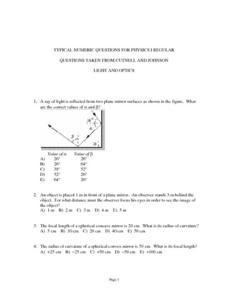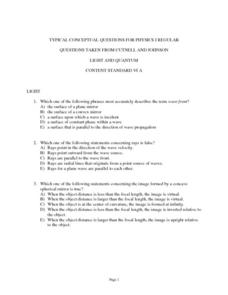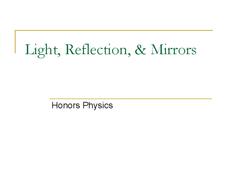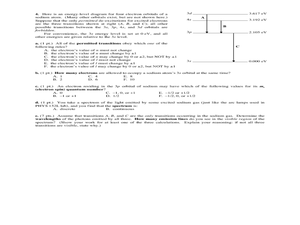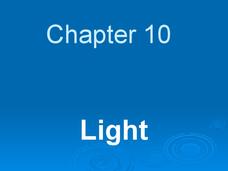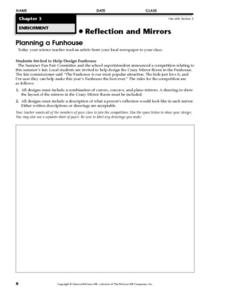Physics Classroom
The L.O.S.T. Art of Image Description - Curved Mirrors
We see curved mirrors every day in spoons, rear-view mirrors, stores as a safety measure, make-up mirrors, and in novelty stores. Scholars explore the changes to an image based on the curve of the mirror, the location of the image, and...
Curated OER
Typical Numeric Questions for Physics I - Light and Optics
Nineteen word problems dealing with frequency, speed, reflection, and refraction of light are provided here. Empower your physics masters to manipulate equations for computing angles, focal lengths, image heights, and more! This is a...
Curated OER
Typical Conceptual Questions for Physics I - Light and Quantum
This is a stellar overview of everything light and quantum! There are 30 multiple choice questions, none of them requiring any mathematical computation. There are a few diagrams to analyze: light rays striking reflective and refractive...
Cornell University
Beam Focusing Using Lenses
Explore optics using an inquiry-based experimental approach! Young scholars use a set of materials to design and build a unit capable of focusing a beam of light. They experiment with different lenses to determine the best approach to...
Cornell University
Building a Compound Light Microscope
What better way to learn how to use a microscope than building your own? A lab investigation has scholars use lenses from magnifying glasses and sheets of cork to design their own compound microscopes. They calculate focal length...
CK-12 Foundation
Cassegrain Telescope
How does a telescope magnify images? Learners first watch a tutorial explaining the basic construction of a telescope. Then they interact with a simulation that allows for changes in the location and diameter of the reflecting mirrors....
Bowels Physics
Light, Reflection, and Mirrors
Explore the connection of light, reflection, and mirrors. A comprehensive lesson introduces the basics of light in relation to reflection and mirrors. After an explanation of the vocabulary, the presentation shows how to create ray...
Urbana School District
Optics
Don't worry, optics is a light topic! The presentation covers reflection, refraction, fiber optics, mirages, prisms, rainbows, dispersion, mirrors, lenses, telescopes, diffraction, the human eye, and much, much more. Presentation is...
Curated OER
Concave Mirrors
Study concave and convex mirrors with an in-depth slideshow presentation. Slides contain term definitions as well as labeled diagrams.
Michigan Technological University
Giant Mirrors
Did you know some retailers use curved mirrors in their fitting rooms to make customers look thinner? Pupils view themselves in convex and concave mirrors to understand the difference. The resource includes big ideas for multiple age...
It's About Time
Curved Mirrors
Discover concave and convex mirrors using a laser light. Scholars experiment with real and virtual images before reading a handout and completing homework questions. Included extensions greatly benefit learners, so take...
Jefferson Lab
Optics: Mirrors and Lenses
Did you see that or did I imagine it? Optical illusions are often created with mirrors and lenses, and here is a presentation that covers many different types of mirrors and lenses and how they work. Flat, concave, and convex mirrors, as...
Curated OER
Light and Geometric Optics
It's time to see the light with a unit that focuses on light and geometric optics, including concave and convex mirrors. A variety of experiments, worksheets, and online activities are included.
Exploratorium
Touch the Spring
Concave mirrors and the images they produce are traditional topics in the physics classroom. This resource explains how to set up an investigation of them, and it provides you with the explanation of concepts.
Exploratorium
Parabolas
A parabolic mirror toy demonstrates how concave mirrors objects reflect light and produce a realistic image at their focal point. This resource probably doesn't explain any more than the printed insert that accompanies such an apparatus...
Exploratorium
Hot Spot
Not only does a concave mirror focus light waves, it can also concentrate infrared radiation into a hot spot. If you have a small electric heater and such a mirror, demonstrate this for your physical science class.
Exploratorium
Cylindrical Mirror
Using flexible mirror-like paper, physical scientists experiment with images produced by curving it and looking into its reflective surface. They find that concave mirrors cause reflected light waves to cross and actually flip the image...
Curated OER
Spherical Mirrors
Some formatting issues will need repair (a few overlapping text boxes and pictures), but overall this is a comprehensive presentation on how light reflects off of spherical mirrors. Both convex and concave mirrors are explained,...
Curated OER
Physics 152 Fall 2004 Final Exam, Parts A, B, C, D
At the end of a general physics course focused on light and electricity, you can administer this exam. Concepts covered include electromagnetism, circuits, induction, light rays, lenses and mirrors, characteristics of light, electron...
Mr. E. Science
Light
Where does bad light end up? In a prism! The presentation covers light, mirrors, lenses, and the structure of the eye. It also provides explanations of reflection, refraction, concave and convex mirrors and lenses, and a comparison of...
Curated OER
Planning a Funhouse
In this mirrors instructional activity, students will design and draw their creation of a "Crazy Mirror Room." They must use a combination of convex, concave, and plane mirrors and they must write a description of what a person's...
Physics Classroom
The Physics Classroom: Lesson 3: Concave Mirrors
Lesson 3 of this tutorial on refraction is on concave mirrors. Content that is covered includes the anatomy of curved mirrors, reflection of light and image formation, ray diagrams, image characteristics for concave mirrors, plus more.
Physics Classroom
The Physics Classroom: Reflection and the Ray Model of Light
A four-lesson tutorial on the reflection and the ray model of light. These complete tutorials include informational text, interactive activities, animations, and quick, interactive comprehension questions.
Georgia State University
Georgia State University: Hyper Physics: Mirrors in Imaging
A discussion from Georgia State University of different types of mirrors and the images which they create. Discusses different instruments which use mirrors to produce images.



